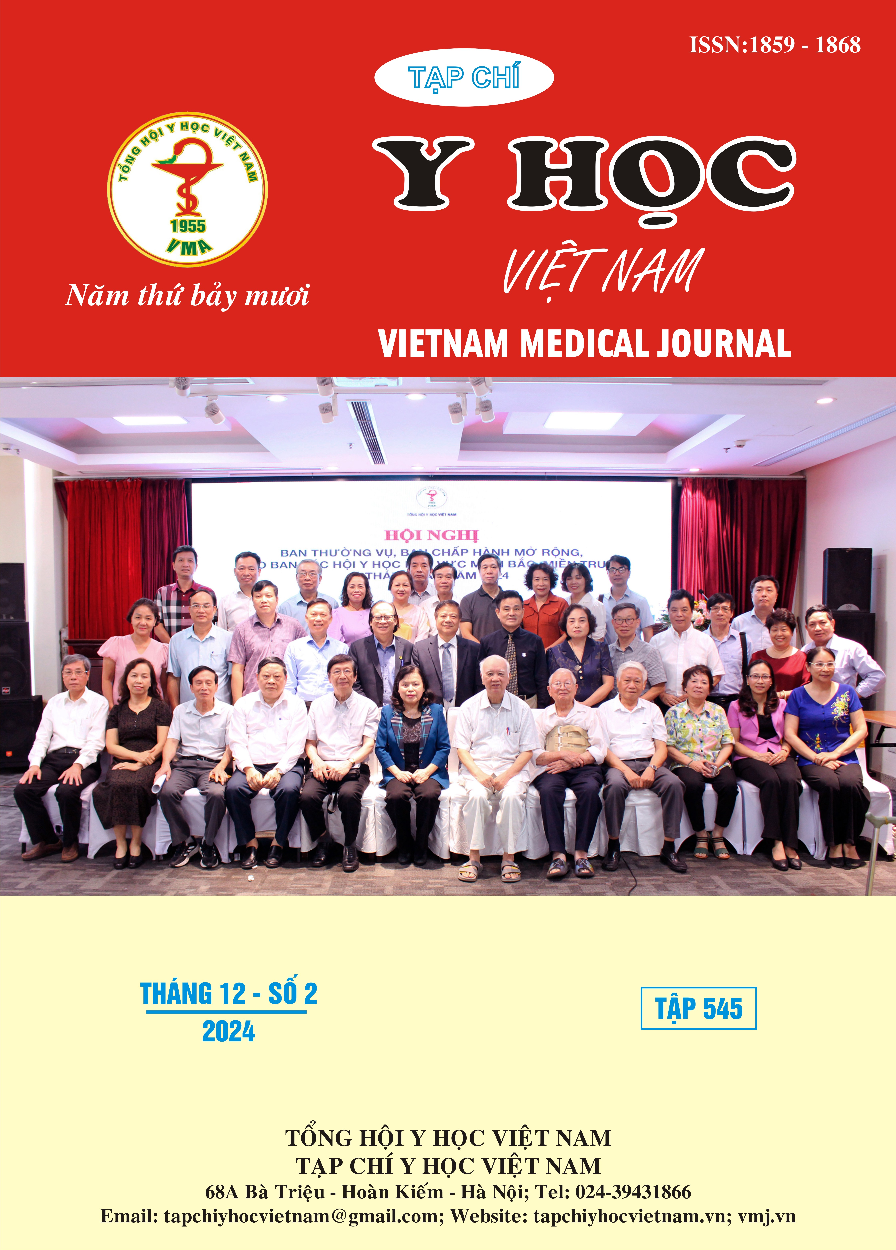THE RESULTS OF TREATMENT OF STAGE IIIB - IV ADENOCARCINOMA LUNG CANCER BY 1ST GENERATION TKI TARGETED DRUGS AT THAI BINH ONCOLOGY CENTER
Main Article Content
Abstract
Describe clinical and paraclinical characteristics and review treatment results of 1st generation TKI targeted drugs in late-stage adenocarcinoma lung cancer at the Oncology Center Thai Binh Provincial General Hospital in 2019 – 2024. Method: 39 patients with stage IIIB - IV lung cancer from January 2019 to July 2024 have EGFR gene mutations in exons 19 and 21. Results: Functional response: 28/39 patients responded functionally to treatment (accounting for 71,8%), 5 patients responded completely, accounting for 12,9%, 17,9% had unchanged disease and 10,3% had progressive disease. Objective response: We recorded 2 patients with complete response, accounting for 5,2%. The rate of patients with partial response was 48,6%, with 35,9% of patients whose disease remained unchanged. 10,3% of patients showed progressive disease. The average progression-free survival time is 7,9 months, the median is 6,9 months, the longest progression-free survival time is 19,5 months, the shortest is 2,8 months. The mean overall survival time was 18,0 ± 0.4 months, median 16,3 months. Conclusion: The most common age group is the age group 71-80 (38,5%), the male/female ratio is 1,44/1, 46,2% of patients smoke, patients are hospitalized for prolonged cough, chest pain, difficulty breathing, palpitations. cervical lymph nodes were seen (76,9%; 43,6%; 20.1%; 23,1%). Tumor location is common in the upper lobe of the right lung and in the periphery (27,6%; 43,1%), average tumor size is 4,29 ± 2 cm. Exon 19 mutations account for 64,1%, exon 21 mutations account for 35,9%. After treatment: complete response accounts for 5,2%. The rate of partial response patients was 48,6%, median progression-free survival time was 6,9 months, median overall survival time was 16,3 months.
Article Details
Keywords
Targeted therapy for lung cancer, erlotinib, gefitinib
References
2. Mai Trọng Khoa, Ngô Thùy Trang, Nguyễn Thị Lan Anh và CS (2016). Nghiên cứu tiến cứu, dịch tễ học phân tử, đánh giá tình trạng đột biến gen EGFR ở các bệnh nhân Việt Nam mắc ung thư phổi dạng biểu mô tuyến, giai đoạn tiến triển, Tạp chí Ung thư học Việt Nam. 2016; 2: 30-36.
3. Nguyễn Bá Đức, Bùi Công Cường and Trần Văn Thuấn. Chẩn đoán và điều trị bệnh ung thư (2017), Ung thư phổi: 176-187.
4. Lê Thu Hà and Trần Văn Thuấn (2016), Đáp ứng thuốc Erlotinib trong điều trị bệnh nhân ung thư phổi không tế bào nhỏ giai đoạn muộn, Tạp chí Y học thực hành. 2016; số 993, tháng 1/2016: 53-55.
5. Kazandjian D, Blumenthal G.M, Yuan W et al (2016), FDA Approval of Gefitinib for the Treatment of Patients with Metastatic EGFR Mutation-Positive Non Small Cell Lung Cancer, Clin Cancer Res. 2016; 22(6): 1307-12.
6. Rosell R, Carcereny E, Gervais R et al (2012). Erlotinib versus standard chemotherapy as first-line treatment for European patients with advanced EGFR mutation-positive non-small-cell lung cancer (EURTAC): a multicentre, open-label, randomised phase 3 trial, Lancet Oncol. 2012; 13(3): 239-46.
7. Nguyễn Minh Hà, Trần Vân Khánh, Tạ Thành Văn và CS (2014), Erlotinib bước một trên bệnh nhân ung thư phổi không tế bào nhỏ giai đoạn muộn có đột biến gen EGFR, Tạp chí nghiên cứu y học. 2014: 7-14.


